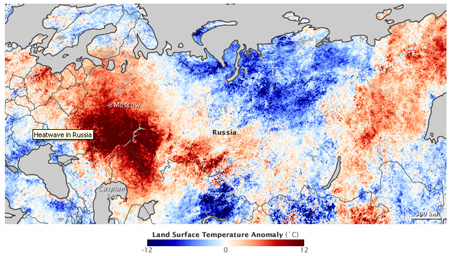Global Warming Made 2010 Russian Heatwave Three Times More Likely, Say Researchers
The extreme Russian heatwave of 2010 was made three times more likely because of man-made climate change, according to a study led by climate scientists and number-crunched by home PC users. But the size of the event was mostly within natural limits, said the scientists, laying to rest a controversy last year over whether the extreme weather was natural or human-induced.
The 2010 heatwave broke all records for Russia – temperatures in the central region of the country, including Moscow, were around 10C above what they should have been for the time of year. More than 50,000 people died from respiratory illnesses and heat stress during that time. The temperatures also had a substantial impact on that year’s Russian wheat harvest, leading to economic losses of more than $15bn.
Two studies published in 2011 looked at the causes of the extreme weather, but they disagreed on whether it was a natural event or whether it was a result of anthropogenic climate change.

The 2010 heatwave broke all records for Russia – temperatures in the central region of the country, including Moscow, were around 10C above what they should have been for the time of year. More than 50,000 people died from respiratory illnesses and heat stress during that time. The temperatures also had a substantial impact on that year’s Russian wheat harvest, leading to economic losses of more than $15bn.
Two studies published in 2011 looked at the causes of the extreme weather, but they disagreed on whether it was a natural event or whether it was a result of anthropogenic climate change.

You can return to the main Market News page, or press the Back button on your browser.

